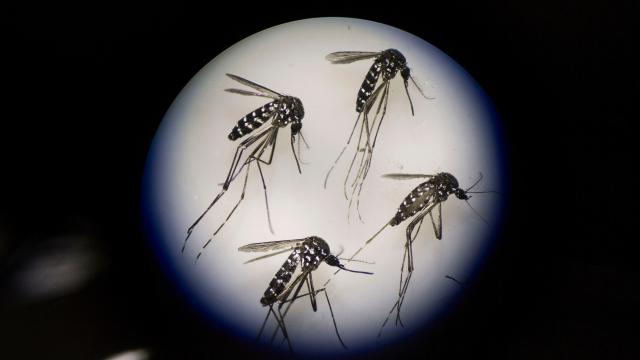Losing weight is definitely tough. So tough, in fact, that scientists have tried to whip up drugs that trick us into feeling full and suppress our appetite. But these concoctions might not just work in people, suggest the authors of a new study out Thursday in Cell. T
hey found that some of these same drugs could also be used to keep mosquitoes from feeding on our blood and spreading diseases like malaria, dengue, and Zika virus.
Study author Leslie B. Vosshall and her team at the Rockefeller University in New York came up with what she plainly admits was an unconventional theory.
“The field has known for a long time that after mosquitoes take a huge blood meal, they lose their appetite for humans, for up to four days. And we were really fascinated to figure out how that happens, and if we could find some way to do that artificially,” she told Gizmodo.
The team theorised that since hunger is such a fundamental part of life, evolutionarily speaking, existing diet drugs that affect certain molecular pathways in the human body could have similar effects on mosquitoes—particularly the female mosquitoes that actually feed on our blood.
“It’s a totally crazy idea. But it was just kind of a leap of faith,” she said.
They zeroed in on a pathway related to neuropeptide Y (NPY), a protein that has been closely studied for its likely role in weight gain and obesity in people. Though we’re still not sure exactly how, scientists think that NPY helps regulate our sense of feeling full and other feeding behaviours.
To test their theory, the researchers fed Aedes aegypti mosquitoes (a species capable of spreading many mosquito-borne diseases, including Zika) experimental human drugs that target a specific receptor of NPY in people, called Y2.
The researchers suspected the drugs, which bind with human NPY receptors to either decrease or increase appetite, would have a similar effect on NPY-like receptors found in mosquitoes.
As they hoped, the diet drug-fed mosquitoes no longer wanted to seek out new hosts for a few days, similar to what happens after they have a blood meal. After further study, the researchers found that these drugs were likely affecting an unique NPY-like receptor called NPYLR7 in the mosquitoes. To be sure, they bred mosquitoes without the functioning NPYLR7 receptor and fed them the drugs again; this time, their loss of appetite was much less apparent.
Important as the experiments with the human drugs were, Vosshall said, they were only the start.
“The whole goal was to find drugs that do not work in people. So that if we dosed up mosquitoes with drugs that worked on them, it wouldn’t accidentally affect people. If, for instance, someone went up to a feeding station and drank the drug,” she explained.
So the team next scoured through hundreds of thousands of molecules that could interact with NPYLR7 but not any other human or mosquito receptors, ultimately settling on one compound. This compound, as with the earlier experiments, seemed capable of suppressing the skeeters’ will to bite and feed (it also didn’t work on the NPYLR7-free mosquitoes, as before).
“We found a single drug, and a single gene in the mosquito that, if you activate the protein that comes from that gene, can turn off their appetite for two or three days,” Vosshall said. “That’s really important, because for those two or three days, out in the field, you would reduce the number of people infected with Zika, dengue, chikungunya, all of those awful diseases.”
This team isn’t the only one trying to develop novel, pesticide-free ways to tackle mosquito-borne diseases. Scientists elsewhere are developing more aggressive methods that send out sterilized male mosquitoes into the wild, effectively dooming a local population to extinction. But Vosshall’s method, if refined, would be less likely to disturb entire ecosystems — possibly alleviating a key concern some scientists have had about the sterilization plan. The diet method could also be used alongside other mosquito control techniques to boost their combined success rate.
“No single approach has ever worked and will ever work by itself. So we view our idea as a method of behavioural control that can integrate with the other ideas floating around, whether it’s insecticides or GMO mosquitoes,” she said. “But anyone claiming that their technology is going to eradicate mosquitoes — it’s just not going to work that way. Nature is just much too smart.”
The next step for Vosshall’s team is more basic research that will hopefully uncover the exact mechanisms through which these drugs are suppressing mosquito appetite, whether they’re affecting the insects’ brains, their sense of hunger, their ability to smell people, or something else. Future research will also need to find more potent chemicals capable of suppressing mosquito appetites for longer. And researchers will need to find the best way to get these eventual drugs to mosquitoes in the wild.
[Cell]
